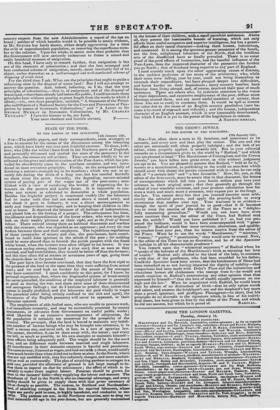THE CROWN JEWELS.
TO THE EDITOR OF THE SPECTATOR. 17th January 1831:
Sin—You often show a turn to be facetious, and sometimes to be sarcastic, and every now and then play the censor. The one and the other, are extremely well, when properly indulged ; and the lash of an editor, when properly applied, is severely felt. But in your editorial remarks on a circumstance given to the world by " Radical," and which you are pleased to head " The Marchioneis of Conyngham and the Crown Jewels," you have fallen into great error, as wits without judgment are apt to do. You are pleased to assume that Radical, " bold as he is," resorts to a mystification, in publishing to the world an anecdote which should cover with shame the parties connected with it—that he can only talk of " a certain lady" and " a late favourite." Now, Sir, you, as the editor of the SPECTATOR, must he aware that in that character, the letters of correspondents which fall into your hands seldom pass into your columns in their original state ; that they generally go through the ordeal of your watchful criticism, and your prudent calculation how far even a word, and much more a sentence, may expose you to the fangs , the law. You cannot deny but that you yourself exercise most arbi. trarily the editorial power, and apply the pruning-knife to every excrescence that catches your eye. Your wariness is so evident-- though the spirit of your journal be so good—that it ill becomes you to treat the caution of the editor of the Times as a " delight. fully unmeaning generalism." Would you not have been even more cautious than was the editor of the Times, had Radical sent you the article ? Would you have published it ? or, had you pos. sessed the boldness, would it have been unaccompanied with " genes ralisms ?" Radical would fear more revisions, alterations, and qualify- ing touches from your pen, than his letters receive from the editor of the Times. Were he to use the words "Marchioness," "mistress,", " woman," " purity," " prostitution," they would soon be erased. Now, is the editor of the Times to use no discretion, and he of the Spectator to indulge in all his characteristic prudence ? You remark upon the "whimsical argument" of Radical when he "speaks of the lowness of the Marchioness's birth as excusing her love of wealth." Radical only alluded to the blood of the lady, to contrast it with that of the gentleman, who had been ennobled by his father. Could the Spectator have been aware, that the battlements of Slane had been remarked on as not having imparted the dignity of nobility—that comparisons had been made with Duke's Place and the industrious and oftentimes honest old clothesmeu who emerge from it—he would not attach suspicion to Radical's entertaining any other opinion than that expressed by himself—" that the love of wealth equally operates on the high and the low." Were he acquainted with Radical, he would learn that he admits of no distinction of birth—that he only values worth and talent, and esteems the bricklayer's son and the shepherd's boy more than a proud, ignorant, and profligate Plantagenet—in short, that his principles do no discredit to the signature which, in lieu of his indivi- dual name, has been given to him by the editor of the Times, and which he did not assume, but which he is proud of. RADICAL.


























 Previous page
Previous page